Looking at cities around the world, we see buildings rise at impressive rates, which might indicate that the construction industry is also on a skyward trajectory. Indeed, relatively recent building methods, such as slip form construction and new materials, such as lightweight concrete, have greatly improved speed and safety.
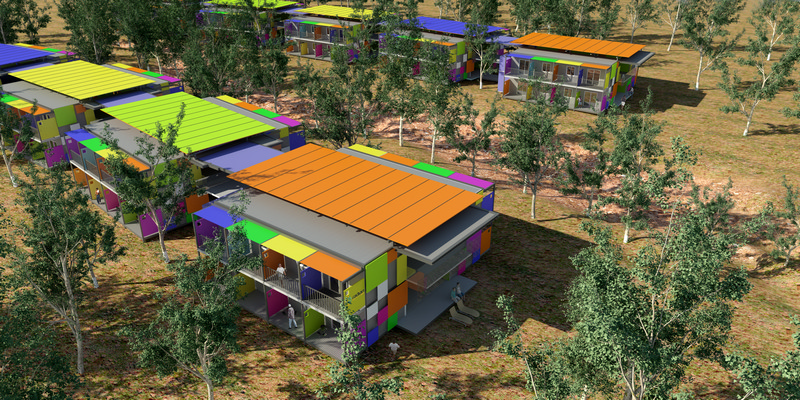 In Australia, as in most developed countries, the housing industry is still considered a relatively traditional, low technology industry with few changes in its structure and processing over the last century. In particular, the building of hotels and housing today is both highly unproductive and inefficient. Recent studies show that productivity in the Australian construction industry has largely flat-lined or decreased in the last 30 years, unlike other industries, such as manufacturing, which has continued to improve. The results are that the construction is a largely low profit industry with low levels of productivity.
In Australia, as in most developed countries, the housing industry is still considered a relatively traditional, low technology industry with few changes in its structure and processing over the last century. In particular, the building of hotels and housing today is both highly unproductive and inefficient. Recent studies show that productivity in the Australian construction industry has largely flat-lined or decreased in the last 30 years, unlike other industries, such as manufacturing, which has continued to improve. The results are that the construction is a largely low profit industry with low levels of productivity.
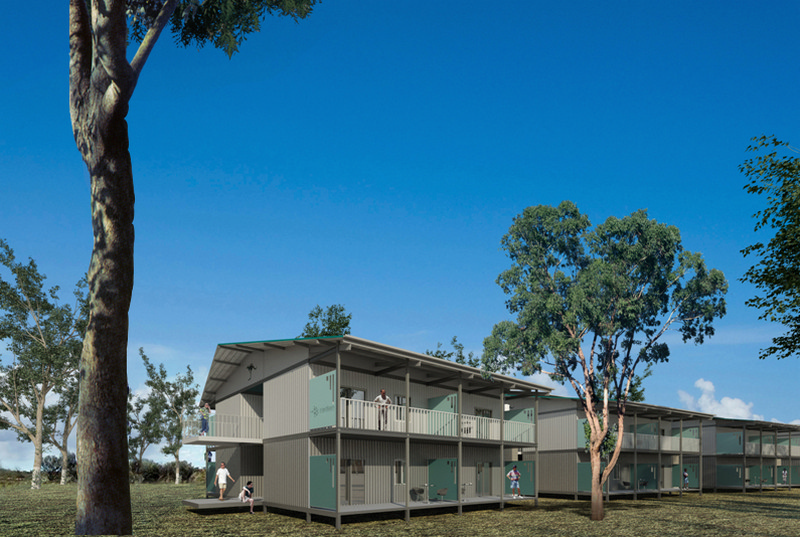 Modular construction systems, together with other types of factory-made buildings, hold the potential to dramatically transform the construction industry landscape around the world.
Modular construction systems, together with other types of factory-made buildings, hold the potential to dramatically transform the construction industry landscape around the world.
The “industrialisation of construction” – manufacturing buildings in a factory – is a logical evolution for this industry. The benefits of such systems are logical and compelling. Quality, speed, and price – the three push-pull points of any project – all stand to be dramatically improved thanks to factory-built construction. Now, buildings can be built quicker, cheaper and with better quality than ever before.
Modular construction, when it arrives in a big way, will radically shift the current paradigm of the building industry.
Modular construction systems
Modular construction systems (or factory-made buildings) are prefabricated buildings consisting of component parts or modules, built in a factory and delivered to site via shipping and truck and assembled on-site using a crane and onsite labour.
The most comprehensive type of factory-made buildings are volumetric modules. Also known as “near complete” modules, they are typically around 95% complete at the factory, requiring very little on-site work, and can be trucked virtually complete from factories around the country or by ship from overseas manufacturing centres, such as China, Vietnam or Thailand.
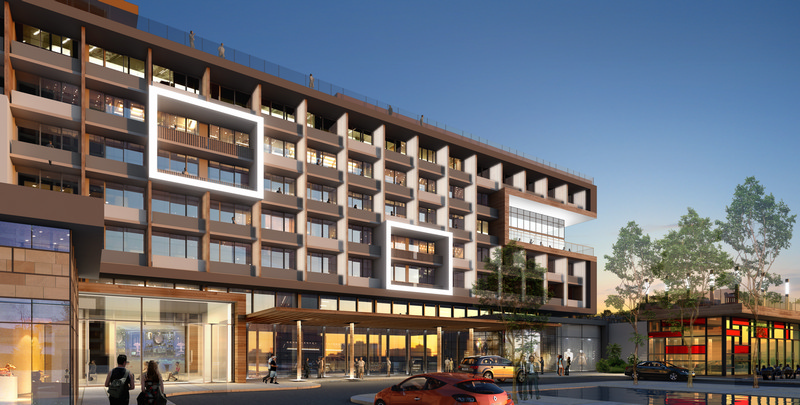 Volumetric modules are made of self-supporting steel boxes, incorporate all living and working areas and are finished to any required specification, including doors, windows, full bathroom, kitchen and laundry, plumbing and electrical. Exteriors are clad in a range of options including steel, alucabond, timber panels, or aesthetic articulation elements. Volumetric modules come in a range of sizes – from standard ISO shipping container dimensions (2.4m wide), through to larger flat bay truck sized modules (up to 3.4m wide) being the maximum width allowable under non-escorted truck travel; up to the oversized modules (over 3.4m wide), where transportation on trucks require special road clearances and escorts.
Volumetric modules are made of self-supporting steel boxes, incorporate all living and working areas and are finished to any required specification, including doors, windows, full bathroom, kitchen and laundry, plumbing and electrical. Exteriors are clad in a range of options including steel, alucabond, timber panels, or aesthetic articulation elements. Volumetric modules come in a range of sizes – from standard ISO shipping container dimensions (2.4m wide), through to larger flat bay truck sized modules (up to 3.4m wide) being the maximum width allowable under non-escorted truck travel; up to the oversized modules (over 3.4m wide), where transportation on trucks require special road clearances and escorts.
Benefits of modular construction
 Factory-made buildings promise substantial benefits as compared to the traditional methods of construction. Its proponents claim it is the new logical frontier of construction methodology. The standout benefit is the tremendous cost and time savings in this method. There are also social and environmental benefits.
Factory-made buildings promise substantial benefits as compared to the traditional methods of construction. Its proponents claim it is the new logical frontier of construction methodology. The standout benefit is the tremendous cost and time savings in this method. There are also social and environmental benefits.
Financial factors – Time is money. And the speed of construction is perhaps the most important benefit of modular construction. Volumetric modules are built inside large factories which allow repetition and specialisation of the different trades, speeding the process and reducing waste. The process is also not weather dependent. A short delivery program reduces land holding costs, on-site works, time and labour costs. Productivity using modular construction is greatly increased and further productivity gains are achieved by scaling up operations, factory automation, and use of off-shore manufacturing centres. Fully specified, volumetric modules can made in six weeks and if pre-designed, in less than four weeks.
Social factors – Modular construction is safer, with manufacturing and assembling on a production line using less machinery and men, in a controlled safe environment. Because modular units are replicated, they can be built accurately by workers skilled at different tasks, further reducing error and accidents. Units are made of a strong steel skeleton, which protects the occupants and is stackable over multiple levels, and reusable or recyclable. At a more macro level, industry experts claim that modular and other off-site manufacturing can help flatten out the “boom bust” nature of the construction industry and enable labour to be organised in a more efficient less volatile nature. This will improve safety and work conditions, stabilising work forces and benefitting economically impoverished regions where manufacturing can take place considerable distances from the markets it serves..
Environmental factors – The construction industry is mostly an environmental vandal, where buildings are delivered but with a huge environmental cost, due primarily to the process of construction, and the environmental performance of the asset over its life cycle.
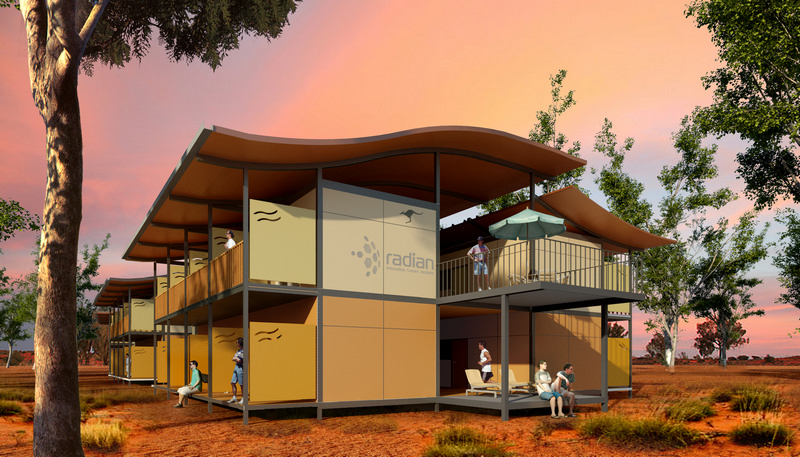 Factory-made buildings enable environmentally sustainable solutions to be developed in a holistic manner. With the same plans being repeated, records of the exact quantity of materials can be established, minimising materials, waste, and energy consumption in the process. Re-use of building modules or frames after their current role and recycling of materials or modules are all achievable using a modular construction system. Manufacturing principles, such as “Just in Time” supply chain management, Lean production systems, BIM (Building Information Management) systems and concurrent engineering and design, achieve higher quality outcome and better control, and higher levels of consistency.
Factory-made buildings enable environmentally sustainable solutions to be developed in a holistic manner. With the same plans being repeated, records of the exact quantity of materials can be established, minimising materials, waste, and energy consumption in the process. Re-use of building modules or frames after their current role and recycling of materials or modules are all achievable using a modular construction system. Manufacturing principles, such as “Just in Time” supply chain management, Lean production systems, BIM (Building Information Management) systems and concurrent engineering and design, achieve higher quality outcome and better control, and higher levels of consistency.
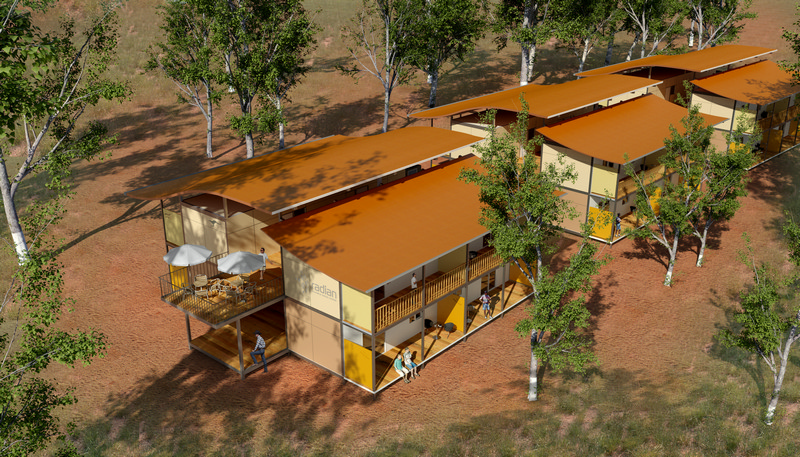 The accuracy of the assembly ensures there are fewer physical gaps in the units, delivering better acoustic and energy-saving outcomes. Once the modules are on-site, quick installation means less site disturbances to surrounding neighbourhoods and the environment.
The accuracy of the assembly ensures there are fewer physical gaps in the units, delivering better acoustic and energy-saving outcomes. Once the modules are on-site, quick installation means less site disturbances to surrounding neighbourhoods and the environment.
Further, in relation to lifecycle of buildings, modular buildings are considered “longer run, progressive” projects. This is because they reduce waste, can be reused or transported and the steel can be recycled. Better quality construction extends building life cycles and operating costs. Unfortunately however, the current discounted cash flow system of valuing property does not encourage value to be given to the long term efficiency and life cycle of the building, are riskier to value and therefore finance.
Modular Hotels, Houses, Apartments and Remote Accommodation
Globally, there is small but growing group of successful modular hotel projects. This is harbinger of the future. Modular hotel projects include Citizen M (UK, Europe), and Premier Inn (UK). Typically modular hotels are built with a conventional podium on which modular “rooms” are stacked. Modular can also be used for lift cores. Volumetric modular is ideally suited to hotels for a number of reasons. First, a hotel room is typically 40m2, and can easily be produced in simple modules of between 3.4 and up to 4.5 meters wide. Secondly, hotel rooms are the same, allowing for a consistency of offer and efficiencies in cleaning, linen, furnishing etc, and thereby very well suited to be manufactured in modular where the efficiencies of replication are brought to bear. Thirdly, modular suits global hotel operators and developers seeking to expand their markets at a fast pace and in diverse countries where consistency of build quality and execution can be difficult. Resort hotels, with a number of stand-alone bungalows, are also well suited to modular construction.
Like hotels, the rapid, replicable and cost-effective nature of modular also lends itself well to apartment buildings. Modules are self-supporting up to 8 stories, and so are a cost-effective for medium rise buildings. The quick timing of product to market is essential in the apartment sector to reduce financial exposure to the developer, given the lag time in converting to sales and settlement of funds. There are many examples of failed apartment development projects that have failed not for want of a good design or product or location, but failure to deliver in time.
 Finally, remote accommodation, including mining camps and townships, are one of the best examples of the growing application of the modular industry. Modular construction enables speed and reliability, and also the ability to deliver quality buildings in some very remote areas. In developed economies, labour costs in remote areas are often crippling – factory-made buildings dramatically reduce on-site labour to installation and fit-out only, thereby dramatically reducing costs. Developing economies face a different challenge – labour is affordable and plentiful, but often lacking requisite skills. Again, modular construction can assist by delivering near-complete buildings to site. These can be dovetailed with local labour programs, where local work-forces can be trained up to assist in the project by doing site-preparation work, some local content elements, installation, commissioning etc.
Finally, remote accommodation, including mining camps and townships, are one of the best examples of the growing application of the modular industry. Modular construction enables speed and reliability, and also the ability to deliver quality buildings in some very remote areas. In developed economies, labour costs in remote areas are often crippling – factory-made buildings dramatically reduce on-site labour to installation and fit-out only, thereby dramatically reducing costs. Developing economies face a different challenge – labour is affordable and plentiful, but often lacking requisite skills. Again, modular construction can assist by delivering near-complete buildings to site. These can be dovetailed with local labour programs, where local work-forces can be trained up to assist in the project by doing site-preparation work, some local content elements, installation, commissioning etc.
Perhaps the biggest potential in remote mining camps and townships however, is in the quality of the offer. For far too long, such accommodation has been reduced to the lowest utilitarian level – an outcome brought about by an engineer’s approach to function over form. In fact the latest generation of mining accommodation, draws on some of the well-established norms of hotel design, creating stylish, roomy, environmentally sensitive design. Examples include use of climate controlled internal corridors, private balconies, and numerous casual informal meeting places.
About Radian
RADIAN™ is a modular building solutions company. We design, manufacture and deliver innovative modular accommodation buildings for companies that care about how they house their people and reducing environmental impact, and offer advisory services for companies considering or undertaking modular projects. Our products include homes, hotels and resorts, mining villages and micro-camps. Radian has developed extensive experience in the modular industry with an active presence in Asia and Australia.
Mal Osborne-Smith – Managing Director
Email: [email protected]













